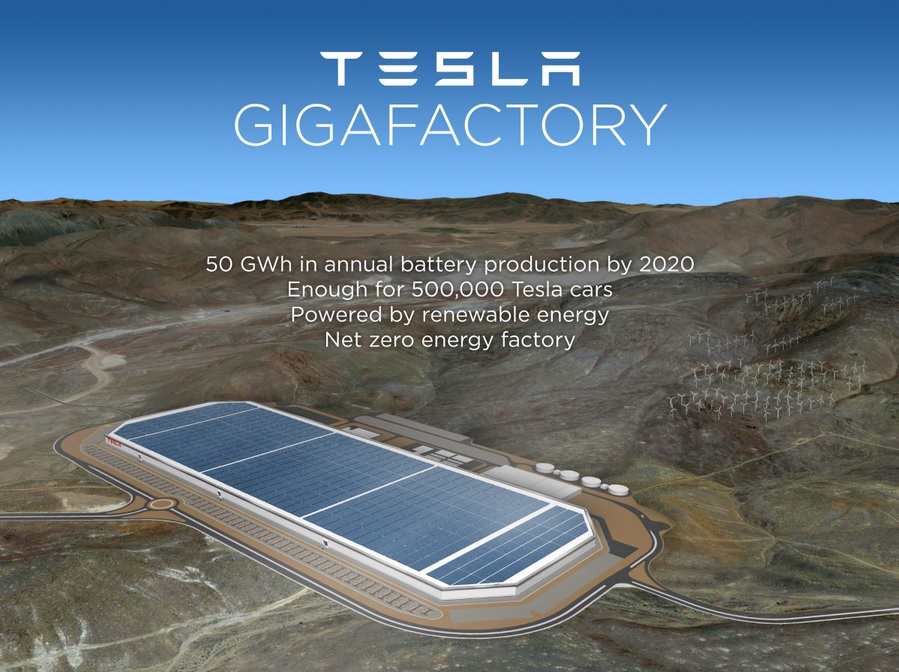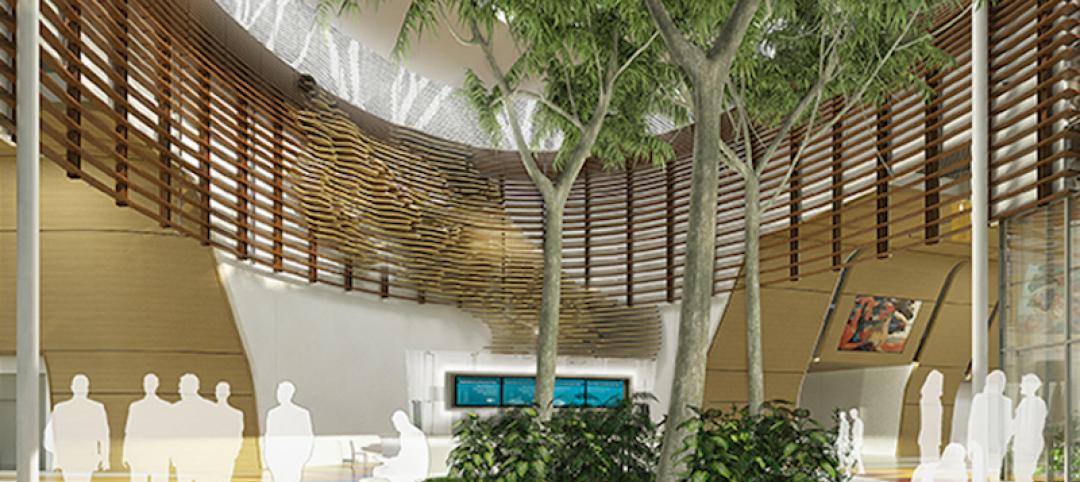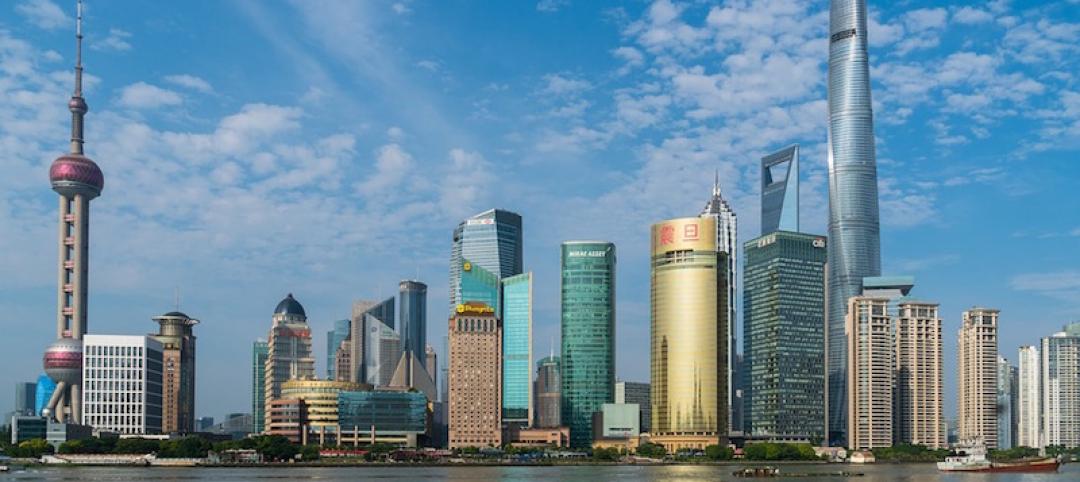Work has begun on Tesla Motors’ “gigafactory,” a $5 billion project on 980 acres in Sparks, Nev., that, when at full capacity in 2020, could annually produce 50 gigawatt-hours of lithium-ion batteries, or enough for 500,000 of Tesla’s electric cars.
Sparks, a suburb of Reno, Nev., was the winner in the gigafactory sweepstakes whose finalists were Fort Worth, Austin, Phoenix, and Albuquerque. Last September, Nevada Gov. Brian Sandoval signed a bill granting $1.3 billion in tax breaks to Tesla—including giving it the land for free—to build this massive plant, which at an estimated 5.5 million sf would be equal to 174 football fields.
Panasonic, which owns a portion of Tesla, last October said it would invest 10 billion Yen—or the equivalent of $92 million—into this project. The Wall Street Journal quoted Panasonic’s CEO, Kazuhiro Tsuga, who promised “installments of similar amounts” into this plant in the future. Currently, Panasonic supplies batteries for Tesla’s cars from its plants in Asia.
Elon Musk, Tesla’s CEO, says he expects Panasonic to contribute between 30% and 40% of the plant’s total cost. Tesla Motors will ante up half of the cost, and will manage the plant itself.
Tesla is building this plant to provide batteries for its Model 3 car, which is scheduled to go into production in late 2017 or early 2018. The plant would also provide batteries for Tesla’s Model S, and its upcoming Model X SUV. However, when this plant is scheduled to open is uncertain, as different news reports have said the opening could be in late 2016 or sometime in 2017.
The Nevada plant’s construction is projected to create between 20,000 and 22,000 jobs, and 6,500 permanent jobs. Over a 20-year period, the plant is expected to add $100 billion to Nevada’s economy.
Tesla’s goal is to produce batteries that are cheap enough for it to be sell its Model 3s for around $35,000. These batteries would also allow the electric cars to drive up to 200 miles before needing recharging.
However, given that Tesla sold between 33,000 and 35,000 cars globally in 2014, according to the website InsideEVs, its dreams of 500,000 units sales seem quixotic, especially given buyers’ lukewarm reception to all-electric cars so far.
To put this into some perspective, the two best-selling vehicle models in the U.S.—the Ford F-series trucks and Toyota Camry—sold 763,000 and 404,000 units in the U.S., respectively, last year, when a total of 16.5 million autos were purchased by American buyers. Toyota offers a gas-electric hybrid model, one of 47 hybrids from different manufacturers available in the U.S., where hybrids account for 3.2% of all light-vehicle sales.
Plug-in electric car sales in the U.S., on the other hand, rose above the 100,000-unit level for the third consecutive year in 2014, according to the website GreenCarReports.
Tesla doesn’t break out its U.S. sales, but given that its Model S starts at $70,000, one would think its market share is small. Nevertheless, the company is banking on a sizable increase in worldwide demand for electric cars. Last week Musk told CNBC that his company “should be able to produce a few million cars a year by 2025.” Tesla recently upgraded its plant in Fremont, Calif., to be able to produce 100,000 electric cars by the end of 2015.
Related Stories
Architects | Nov 11, 2016
Six finalists selected for London’s Illuminated River competition
The competition is searching for the best design for lighting the bridges of central London.
Building Team | Nov 7, 2016
Taking cues from nature: How biomimicry can drive ROI for hoteliers
Biomimicry takes inspiration from nature’s form, processes, and ecosystems to solve human problems. This design method, which incorporates lessons learned from nature, can constantly morph in response to new challenges in our environments, writes Gensler's Lorraine Francis.
Building Team | Nov 2, 2016
AIA 'I Look Up Film Challenge' People's Choice Award revealed
Top films address accessibility for the disabled, 18th century urban planning, and a recycling facility that does more than repurpose material.
Building Team | Oct 31, 2016
The world’s 100 tallest buildings: Who owns and has developed the most?
All but four owners/developers on the list are located in the United Arab Emirates, China, or Hong Kong.
Architects | Oct 24, 2016
Winners of the 2016 AAP American Architecture Prize announced
The AAP recognizes the most outstanding architecture worldwide across three disciplines: architecture, interior design, and landscape architecture.
Sponsored | Building Team | Oct 4, 2016
The talent shortage: Will the training the AEC industry desperately needs arrive in time?
As the construction industry bounces back from the Great Recession, an entirely new class of tech-savvy construction professionals has been created, and the supply of these highly skilled, tech-proficient pros has been quickly exhausted.
Sponsored | Building Team | Sep 29, 2016
Manners Still Matter in Advancing Your AEC Career
A well-written thank-you note can land you the job you've been looking for.
Sponsored | | Sep 29, 2016
How to Get Your Best AEC Job in a Virtual World
Top tips for getting that AEC-industry job you’ve always dreamed of in today’s virtual world.
Sponsored | Building Team | Sep 29, 2016
How to Stand Out to Get That AEC Industry ‘Dream Job’
In searching for your AEC dream job, it's important to differentiate yourself in the hiring process. Here are 6 tips to help you do just that.
Sponsored | Building Team | Sep 6, 2016
EFFECTIVE MENTORING: Making It Work for Your AEC Career
Mentoring programs at AEC firms can take many forms. Being involved in a mentoring program, as mentor or protege, can be an important step in career development for design. engineering, and construction professionals.


















